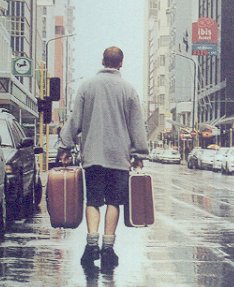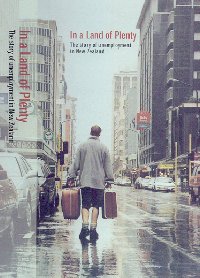No.169 18 July 2002
 BACK
BACK
|
— Gordon Campbell, from The Film Festival 2002 Programme |
Barry, the director of the acclaimed “Someone Else’s Country—the story of the New Right revolution in New Zealand”, has again brought together a collection of speeches and interviews from political leaders and ordinary New Zealanders — much of which has been retrieved from TV news archives. The documentary charts the rise of unemployment amidst the “new right” policies in the 80s and 90s and the political and bureaucratic response that followed.
Barry reminds us that from the 1930s to the mid 1980s, successive New Zealand Governments regarded full employment as the first objective of economic policy. With the election of the fourth Labour government in 1984, the policies and institutions which had sustained full employment were abandoned or modified, and unemployment became an instrument of economic management. This film traces the close links between monetary policy, the fight against inflation, and the consequential levels of unemployment over this 15-year period.
The 2-hour documentary stops its historical narrative at the election of the Labour-led government at the end of 1999. In the midst of another election campaign three years later, viewers are naturally left wondering how Alister Barry would present the more recent initiatives on these issues ... as the story of unemployment in New Zealand continues. — vivian Hutchinson
 ALISTER BARRY’S new film “In a Land of Plenty” will be showing at the Film Festivals in Wellington and Auckland over the next two weeks. It is an excellent overview of the story of unemployment on New Zealand from 1984 to 1999.
ALISTER BARRY’S new film “In a Land of Plenty” will be showing at the Film Festivals in Wellington and Auckland over the next two weeks. It is an excellent overview of the story of unemployment on New Zealand from 1984 to 1999.
“So why did it change? That is what I set out to investigate in my research for this film. A script was developed and then the huge NZ Television archives database and film library searched for relevant material. Interviews were planned and filmed. In many ways this documentary is a more revealing film than “Someone Else’s Country”, more “investigative” in the sense that people don’t know much of this story in the same way that we all intuitively knew the story of the new right revolution”.


